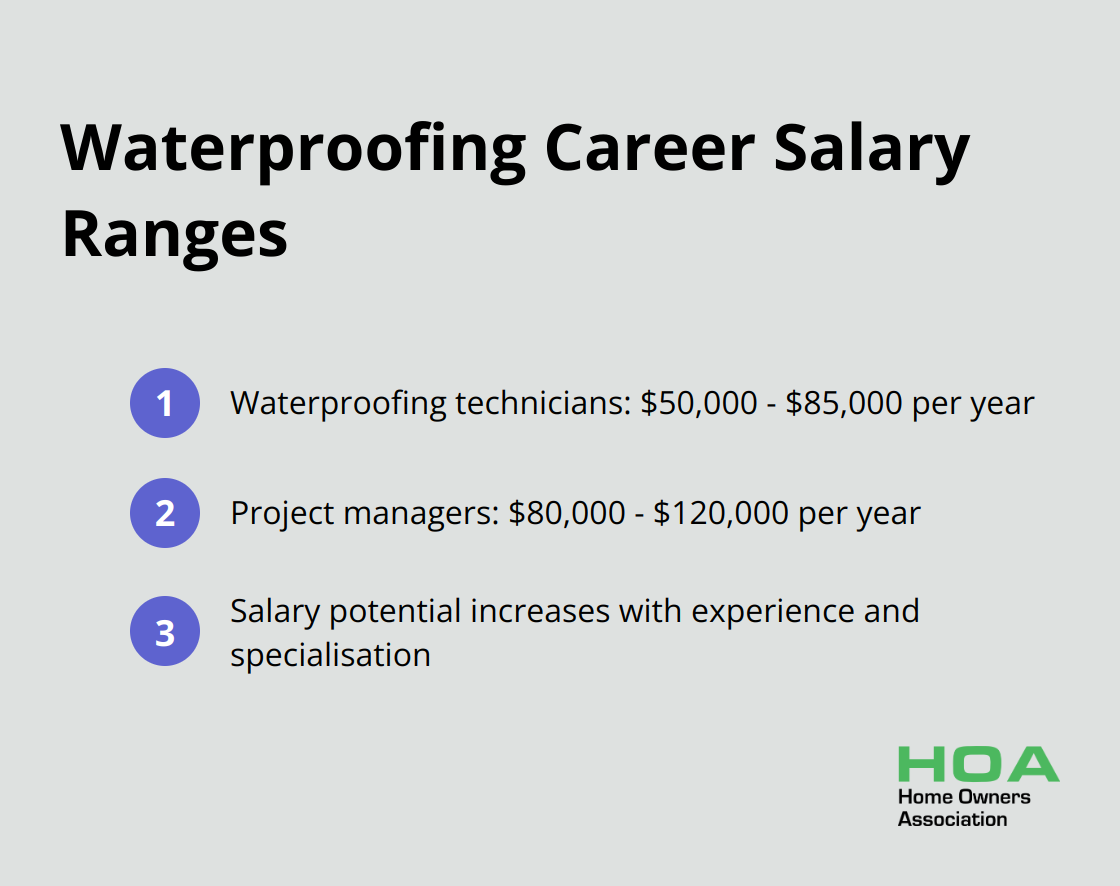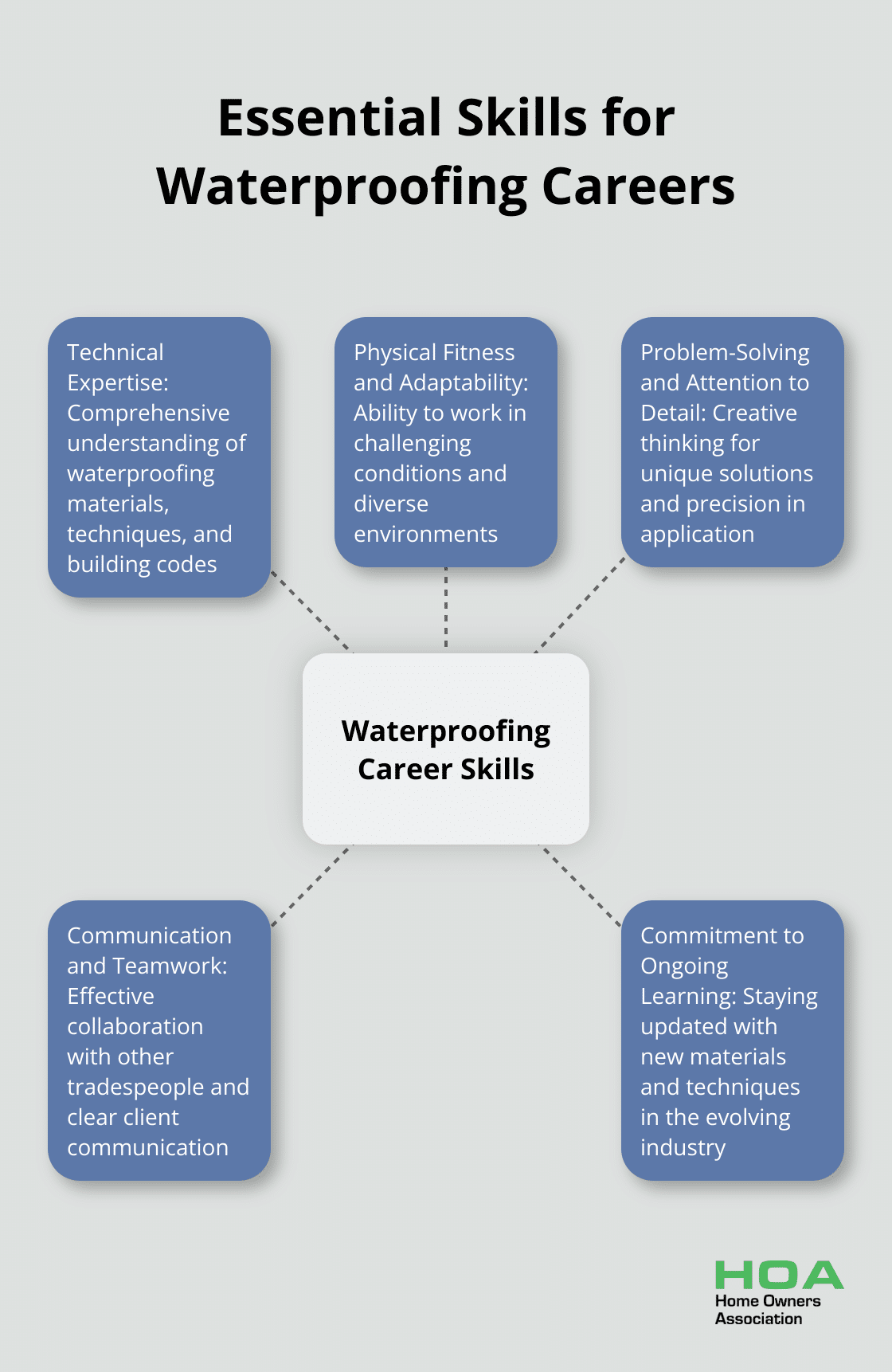
At Home Owners Association, we understand the importance of protecting your property from water damage. The waterproofing industry plays a vital role in construction and maintenance, offering a range of exciting career opportunities.
Jobs in waterproofing are diverse and rewarding, with potential for growth and specialisation. This blog post explores the various roles available in this essential field and provides insights into the skills and qualifications needed to succeed.
Why Waterproofing Is Essential
The Cornerstone of Modern Construction
Waterproofing stands as a fundamental element in modern construction, safeguarding structures from water damage. At Home Owners Association, we’ve witnessed how effective waterproofing saves homeowners substantial amounts (often thousands of dollars) in repairs and maintenance costs.
A Booming Market
The Australian waterproofing market is on an upward trajectory. Industry reports project the acrylic polymer emulsion market, a key component in waterproofing, to reach US$18.1 billion by 2026, after growing at a CAGR of 6.2% during 2021-2026. This surge stems from increased construction activities, particularly in urban areas susceptible to heavy rainfall and flooding.

Diverse Project Types
Waterproofing projects encompass a wide range of applications, from residential basements to large-scale commercial buildings. Common areas include:
- Foundation waterproofing
- Roof and terrace protection
- Bathroom and wet area sealing
- Swimming pool insulation
- Bridge and tunnel safeguarding
Each project type demands specific skills and materials, creating a variety of job opportunities within the industry.
Technological Advancements
The waterproofing industry continues to evolve. Innovative technologies and materials emerge to enhance efficiency and effectiveness. For example, liquid-applied membranes have gained popularity due to their easy DIY application, suitability for a wide range of substrates, and anti-fracture protection. These advancements spawn new job roles and require professionals to update their skills continuously.
Environmental Considerations
As sustainability takes centre stage, eco-friendly waterproofing solutions become increasingly important. Many projects now require waterproofing methods that are not only effective but also environmentally responsible. This trend opens up new opportunities for specialists in green waterproofing technologies.
The robust and growing job market in the waterproofing industry offers diverse opportunities. With ongoing advancements in technology and increasing demand for waterproofing services, the future looks promising for those considering a career in this field. In the next section, we’ll explore the key job roles that make up this dynamic industry.
Exploring Key Waterproofing Careers
The waterproofing industry offers a diverse range of career paths, each playing an important role in protecting structures from water damage. These professionals contribute to the longevity and safety of homes across Australia.
Waterproofing Technician: The Frontline Defender
Waterproofing technicians form the backbone of the industry. These skilled professionals apply waterproofing materials to various surfaces, ensuring buildings remain dry and protected. Speciality pay for waterproofing technicians can range from $50,000 up to $85,000 a year.
The role requires physical stamina and attention to detail. Technicians must read blueprints, prepare surfaces, and apply a range of waterproofing products. Many employers offer comprehensive training programmes and team-building activities to foster a collaborative work environment.
Project Manager: Orchestrating Waterproofing Success
Waterproofing project managers oversee large-scale operations, coordinate teams, and ensure projects finish on time and within budget. These professionals typically earn between AUD $80,000 to $120,000 annually (reflecting their critical role in project success).
Effective project managers in the waterproofing industry combine technical knowledge with strong leadership skills. They understand the intricacies of different waterproofing techniques while managing client expectations and team performance. Many successful project managers start as technicians, gaining hands-on experience before moving into management roles.

Quality Control Inspector: Ensuring Excellence
Quality control inspectors maintain the high standards of waterproofing work. These professionals conduct thorough inspections of completed projects, identifying any issues that could compromise the waterproofing integrity.
Inspectors must have a keen eye for detail and a comprehensive understanding of waterproofing standards and building codes. They often work closely with project managers and technicians to address any concerns and ensure all work meets or exceeds industry standards. Knowledge of waterproofing products commonly used and good oral and written communication skills are essential for this role.
Sales and Estimator: Bridging Client Needs and Solutions
Sales and estimator roles in the waterproofing industry require a unique blend of technical knowledge and interpersonal skills. These professionals assess client needs, provide cost estimates, and recommend appropriate waterproofing solutions.
Successful sales and estimators in waterproofing possess in-depth product knowledge, strong communication skills, and the ability to build lasting client relationships. They play a key role in driving business growth and ensuring customer satisfaction.
The waterproofing industry continues to evolve, driven by technological advancements and increasing demand. For those considering a career in this field, the opportunities are abundant and diverse. Next, we’ll explore the skills and qualifications necessary to thrive in these roles and build a successful career in waterproofing.
Essential Skills for a Successful Waterproofing Career

Technical Expertise
A comprehensive understanding of waterproofing materials and techniques forms the foundation of success in this industry. Professionals must know various membrane types, sealants, and application methods. Familiarity with building codes and standards is also important. Many employers (including top firms like Wet-seal and Spectech Group) offer on-the-job training to keep technicians up-to-date with the latest industry developments.
The Certificate III in Construction Waterproofing (CPC31420) is designed to meet the needs of workers who undertake waterproofing for residential and commercial construction work, providing valuable qualifications that cover essential skills and knowledge for the industry.
Physical Fitness and Adaptability
Waterproofing work demands physical strength and stamina. Professionals often work in challenging conditions, including confined spaces, heights, and varying weather.
Adaptability is essential. Projects range from small residential bathrooms to large commercial buildings, each presenting unique challenges. The ability to work comfortably in diverse environments is a valuable asset in this field.
Problem-Solving and Attention to Detail
Every waterproofing project is unique, requiring professionals to think creatively and develop tailored solutions.
Precision is equally critical. A minor oversight can lead to significant water damage.
Communication and Teamwork
Effective communication and teamwork are vital in the waterproofing industry. Professionals often work alongside other tradespeople and need to coordinate their efforts seamlessly. Clear communication with clients is also essential, particularly when explaining technical aspects of the work.
Commitment to Ongoing Learning
The waterproofing industry evolves constantly, with new materials and techniques emerging regularly. Successful professionals commit to ongoing learning and skill development. Many companies offer in-house training programmes, and industry associations provide workshops and seminars.
The Australian Waterproofing Association offers a 3-hour workshop that provides an overview of the NCC hierarchy and the what, where, and how of waterproofing.
Final Thoughts
The waterproofing industry offers numerous career opportunities with promising growth potential. Jobs in waterproofing range from hands-on technician roles to project management positions, providing diverse paths for professional development. As urban development continues and building sustainability gains importance, the demand for skilled waterproofing professionals will likely increase.
Aspiring waterproofing professionals should obtain relevant certifications and gain practical experience through vocational training or apprenticeships. Networking within the industry and staying informed about the latest trends and technologies will prove beneficial for career advancement. The sector’s evolution presents exciting opportunities for those who invest in their skills and embrace innovation.
At Home Owners Association, we understand the value of quality waterproofing in maintaining property integrity. Our members in Melbourne can access trade pricing and expert advice to ensure their waterproofing projects meet high standards. The waterproofing sector offers both job satisfaction and financial stability for those willing to dedicate themselves to this essential field.





